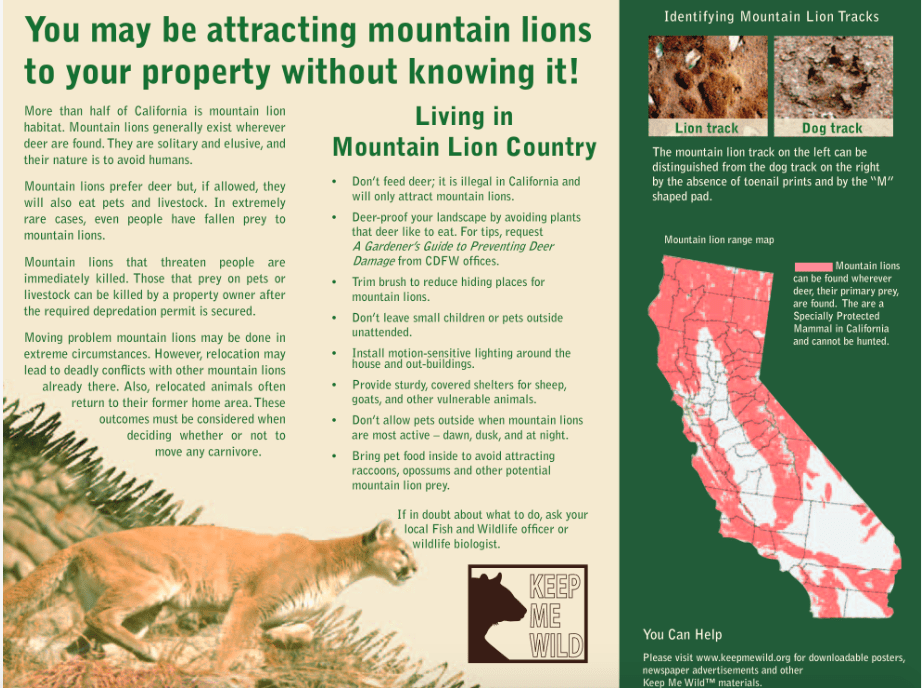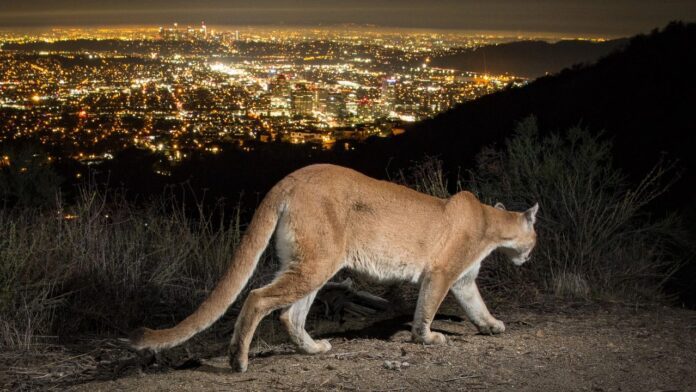On August 23, 2022 at 11:45pm a mountain lion was sighted on the 1900 block of Bonita Ave. The cougar had traveled about a mile away from the Burbank hills and crossed the busy Glenoaks Boulevard before being spotted in a residential neighborhood. The Burbank Animal Shelter put out an alert on social media and released a community mountain lion awareness guide.

The Burbank hills are part of the Verdugo mountains in which mountain lions coexist. While seeing one in a residential neighborhood might initially be alarming, very rarely does it pose a threat to public safety. Across the globe, wild mammals coexisting with people are becoming increasingly nocturnal, or almost exclusively active at night. This strategy enables wildlife to use the same space as people by timing their activity with human avoidance. Cougars are no exception to this rule, but this does not mean that daytime interactions are impossible. Mountain lions prey on deer, coyotes, and raccoons, all of which are abundant along the urban edge. The search for food and water will sometimes drive the cats into the city but for the most part, they avoid urban areas.
Nikita was our latest resident mountain lion living in the Verdugo mountains. This adult female was discovered by community scientists in the fall of 2009 and was known to have two litters with P-41, a male lion monitored by the National Park Service (NPS), and known to frequent the Shadow Hills area. Unfortunately, none of their litters were known to have made it on to adulthood in the wild and P-41 was eventually found dead after the La Tuna fires in 2017. It has been one year since Nikita has been spotted on trail cameras, and the big question remains at hand. Is the Bonita Ave. sighting Nikita? Or do we have a new mountain lion in town?

Mountain lions require a lot of space, and their ideal habitat range is approximately 30-300 square miles, depending on the sex and age of the lion as well as geographic region. NPS recorded P-41’s home range as just 21 square miles. The home range sizes for all other cougars studied by NPS in the Santa Monica Mountains region averaged 143 square miles for adult males and 51 square miles for adult females.They are lone creatures that will often fight other mountain lions for territory, and are often killed on busy highways trying to find mates or uninhabited spaces.
Korinna Domingo is the Director and Founder of the Cougar Conservancy and a Burbank native. Domingo started the conservancy in 2020 after mountain lion P-56 was legally killed on a depredation permit, and she felt compelled to assist community members in coexisting with these big cats. “Our mission is to reduce human wildlife conflict and conserve cougar populations using science-based management and conservation,” said Domingo. “The Cougar Conservancy helps to community members improve animal husbandry practices (from pets to hobby livestock) offers educational opportunities for the public, with the goal of making individuals feel informed and empowered about living and recreating in our local mountain ranges.”

Some of the work the Cougar Conservancy does is presenting to different communities like homeowner associations, consulting with individual residents, businesses, cities, and working with local wildlife authorities. Domingo and her team offer assistance programs and services that other organizations don’t have. Whether you need help building cougar-proof enclosures or just need someone to come assess your property for recommendations on being cougar-safe, the conservancy provides just that. “We assess all the different risk factors on the property, and give recommendations based on what we see, what their needs are, what animals they have at home, and how they’re using that property,” said Domingo.
Domingo grew up in Burbank and completed some of her undergraduate research right here in the Verdugo mountains, placing trail cameras around the Stough Canyon nature area. In April of this year, the Cougar Conservancy co-hosted two Mountain Lion Workshops in collaboration with the City of Burbank at the Stough Canyon Nature Center. The educational workshops were geared at local community members and families and covered topics such as cougar ecology, behavior, home safety, and trail safety. Domingo is a big advocate for mountain lions and worked with the Mountain Lion Foundation and the Center for Biological Diversity to petition for six genetically distinct sub-populations along the Central Coast and in Southern California to be listed under the California Endangered Species Act in 2019.

Domingo is anxious to see the footage captured of the Bonita Ave. lion. “It could be a new mountain lion that is making its way from the San Gabriel Mountains. Animals in urban environments can be dispersing individuals trying to find their own home range or territory. So we could have a new lion in the Verdugo mountains,” added Domingo excitedly.
So what are some pro-tips for recreating responsibly in cougar country? Domingo suggests being aware of your surroundings at all times, keep dogs on leashes that are six feet long or less, and always keep children within arms reach. “I think a big part of safe and responsible recreation in wild spaces means that you take the time to demonstrate best practices and talk to children about safety,” said Domingo. “Often you don’t see the wild animal first, you hear the cracking of a stick or a rustle in the leaves. So you want to make sure that you can hear those auditory cues and be aware of what’s going on around you,” she adds. She doesn’t recommend hiking with headphones so that you are fully aware of your environment.

Domingo also suggests hiking with groups, and clapping your hands loudly before turning blind corners to let wildlife know you are there and give them time to move away from you. “You don’t want to surprise a mountain lion, so by giving them that opportunity to move away is one way to just prevent conflicts in general,” adds Domingo. While encounters are very rare, they can happen. On Monday, September 26th, the California Department of Fish and Wildlife reported that a seven year old boy was attacked by a mountain lion while hiking with his father at Pico Canyon Park in Stevenson Ranch. The boy sustained non-life threatening injuries and the father was able to scare the cat away.
What to do if you see a mountain lion
If you do see a mountaintion, Domingo suggests picking up your dog or child in your arms without crouching down for too long. If your dog is too large to pick up, make sure you pull it in close to you. You want to be big and loud. If you have a jacket you can raise it above your arms to look even bigger. “I think the big thing is not to act like prey. Be big, be loud, don’t run. Running can trigger a mountain lion’s instinct to chase,” she adds. Air horns are a good tool to have when hiking, and it’s always important to make sure you give room for the lion to be able to move past you on the trail. If the cat continues to show interest in you after you look big, you can yell, deploy your air horn or throw items at it which may help deter any further interest. While attacks are extremely rare, Domingo suggests fighting back if you are in that situation.

Reporting mountain lion sightings
The public is encouraged to report mountain lion sightings on a trail or even in your Burbank neighborhood. To report cougar or other wildlife sightings to the City of Burbank, you can call 818-238-3340.
Individuals are encouraged to report mountain lion sightings to the National Park Service who have been studying lions in the Santa Monica Mountains, Simi Hills, Verdugo Mountains, and surrounding areas since 2002. You can send an email to SAMO_mountainlions@nps.gov or call 1-805-370-2317 and include the location, date, and time of the sighting, and any photos or video you may have.
For sightings outside of the above-mentioned areas, you can report to the Cougar Conservancy here. The Cougar Conservancy is also a great resource and can provide coexistence support.
For more information on living in cougar habitat, being a good neighbor to wildlife, home safety tips, and trail safety tips, visit the Cougar Conservancy resources page here.























